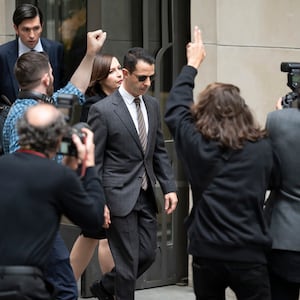For those eager to revisit one of the darkest days in American history, Four Hours at the Capitol provides a first-hand account of the insurrection carried out by then-President Donald Trump’s delusional acolytes on Jan. 6, 2021. Culled from numerous up-close-and-personal video sources, and narrated by congressmen, journalists, and traitorous Proud Boys and “activists” who participated in the attack, it’s a time capsule that’s short on context—and condemnation of the numerous figures responsible for inciting the mêlée—but long on harrowing and damning footage of the disgraceful assault.
Director Jamie Roberts’ feature-length HBO documentary (Oct. 20) features no prologue covering the 2020 presidential election that concluded with Donald Trump decisively losing to Joe Biden, or Trump’s subsequent promulgation of the “Big Lie” which stated that he’d been cheated out of a second term due to “election fraud” that innumerable legislatures and courts—many overseen by Republicans—confirmed did not exist. Nor does it cover both the efforts of congressional Republicans to back Trump’s “Stop the Steal” conspiracy theory by refusing to certify the election’s results, and national right-wing media’s endless coverage of this fictional miscarriage of justice. The result is a narrowly focused work that, by eschewing the bigger picture, feels like only half the story, concerned far more with experiential you-are-there horror than comprehensive censure.
Four Hours at the Capitol would have benefited from more coverage of Trump, Josh Hawley, Ted Cruz, Marjorie Taylor Greene, and Rudy Giuliani stirring the pot for weeks and months before Jan. 6, intent on convincing their supporters that some great democracy-undermining travesty was taking place. Instead, it assumes viewers know that backstory, and simply sets about situating them in the thick of the abominable action. The film begins at 10:35 am, with wheelchair-bound Proud Boy Eddie Block videotaping himself and his white-nationalist buddies as they attend Trump’s speech (during which the president tells his followers, “If you don’t fight like hell, you’re not going to have a country anymore”), and then take his advice and head to the Capitol. There, they and many other faux-patriots rile themselves up with chants like “Fuck ANTIFA!” and “1776”—the latter a revolutionary rallying cry that misses the point that this 2021 rebellion is against the United States—until they all finally decide that words aren’t enough and begin storming the insufficiently defended barricades.
We’ve all seen what comes next: an escalation of violence that involves threats against Vice President Mike Pence; the invasion of the Capitol itself; brutal clashes with law enforcement (who are outnumbered by the thousands); and the death of one police officer (four more committed suicide shortly thereafter). There are also a few casualties on the insurrectionists’ side—most famously, Ashli Babbitt, who’s shot dead while trying to breach a passageway that leads to the Speaker’s Lobby. Yet Four Hours at the Capitol wastes precious sympathy on such individuals; its portrait makes clear that these fanatics were driven by conspiracy theory-fueled anger and treasonous fantasies. Listening to “Cowboys for Trump” bigwig Couy Griffin, who believes Trump was divinely chosen to rule, and “activist filmmaker” Nick Alvear, who babbles on about Trump’s support for their mission to save 800,000+ kids from sexual slavery (QAnon alert!), is to be confronted with the basic fact that the Jan. 6 insurrectionists weren’t just criminals, but also lunatic zealots consumed with nonsense.
By providing them with a platform, Four Hours at the Capitol allows its pro-riot voices to damn themselves. Moreover, it puts the lie to Trumpers’ purported “Back the Blue”-branded love of the police, given that thousands of insurrectionists spent the day viciously attacking men and women who had sworn to protect and serve. Clips of screaming-mad traitors crashing through gates, wielding baseball bats, hockey sticks, and other makeshift weapons to assault police officers, and using the mass of their mob weight to try to overwhelm DC Metro Police forces all underscore the war zone-like environment that soon developed. Trump’s claims that there was “zero threat,” and that his minions had a great relationship with Capitol guards, are definitively disproven by Roberts’ expertly-assembled, chronologically-arranged material.
The fact that Georgia’s Republican senator Buddy Carter decries the insurrectionists’ methods but still remains proud that, once the chaos was over, he voted to decertify the election speaks to the grander problem plaguing both the Republican Party and the country as a whole—namely, that a good segment of the American citizenry and ruling elite are intent on winning at any (deceitful, shameful, anti-democratic) cost. Four Hours at the Capitol only briefly touches on that macro concern, however, opting to concentrate on the madness of Jan. 6 itself. In that limited regard, it’s a success, thanks in large part to distressed commentary from a collection of congresspeople whose lives were put in harm’s way by the attempted coup, including Adam Kinzinger, Eric Swalwell, Rosa DeLauro, Jason Crow, Lisa Blunt Rochester and Ruben Gallego, a Marine Corps vet who says that, should the House floor have been breached, he was ready to stab an insurrectionist in the eye or throat in order to procure their weapon and fight for his life.
Most affecting of all is a late sequence about the mob’s abduction of D.C. Metro Police officer Mike Fanone, which blends his present-day recollections of the incident—culminating with him being tased by the mob as they scream, “I got one!”—with corroborating video evidence. Fanone’s description of this free-for-all as “medieval” is an apt one, as Four Hours at the Capitol focuses heavily on the efforts of law enforcement (led by courageous commanders like Ramey Kyle) to hold their ground and not let their marauding adversaries have their way. With skirmishes over the January 6 Commission (and its outstanding subpoenas to Trumpers like Mark Meadows and Steve Bannon) still raging today, Roberts’ film may not get to the heart of this complicated matter. At its finest, though, it reveals the ugly truth about that winter day, when a president commanded his disciples to overthrow the United States government, and—while ultimately to no avail—they complied.







